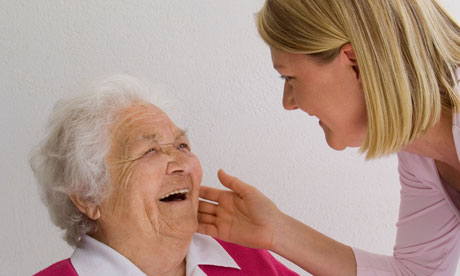
Women provide the bulk of social care – both informally as carers to family members, and as professionals – which means they are almost certainly carrying a disproportionate burden of the spending cuts imposed on council social care departments.
Local authorities in England are cutting an estimated £1bn from their budgets in 2011-12, and a significant chunk of this will come in the form of reduced services to carers and the people they care for, from help around the house to episodes of respite care.
Charities say the cuts, coupled with benefit changes, are piling the pressure on women carers – including the so-called "sandwich generation" of mothers who could lose out on welfare support that helps them look after both children and elderly relatives.
As well as making it likely that more women will have to give up work to care, the cuts increase the chances of this largely unsung and predominantly female workforce experiencing stress, ill health, poverty and debt, according to the charity Carers UK.
About 3.4 million (58%) of carers are women, as are one in five carers aged 54 to 60 – the "peak" time for caring. Of the estimated 662,000 carers who combine part-time work with caring, 89% are female.
"When cuts take away a service – even at the lower 'moderate' end of the personal care scale – these are often essential to support a family and can make the difference between a family which is coping and one that is sliding into chaos," said Emily Holzhausen, the director of policy and public affairs at Carers UK.
"There's often not a lot of capacity for families to pick up more care responsibilities. One in five people give up work to care and the vast majority of these are women."
Carers are particularly concerned about coalition plans to cut £2bn from the disability benefit budget. In order to qualify for a carer's allowance payment, carers need to care for someone who qualifies for a certain level of disability allowance.
The government has yet to issue estimates of how many carers will lose out. About 74% of carers allowance claimants are women. Carers UK has warned that the impact – on both carers and the cared for – could be "devastating".
In opposition, David Cameron, drawing on his own experience of caring for his disabled son, Ivan, said he was "committed to supporting families that care, day in and day out".
He said in a speech in July 2009 that although tough decisions would have to be made about the limits of state provision "it would run entirely against the grain of the Conservative party I lead to neglect the people who need our help the most".
Women are also more likely to have greater need of social care services, either because of age-related disability or chronic illness (women live longer) or because of mental illness (women are more likely to have anxiety and depression).
In many areas NHS services are looking to cut back on mental health services. Teenage girls will be affected by planned cuts to teenage pregnancy programmes.

